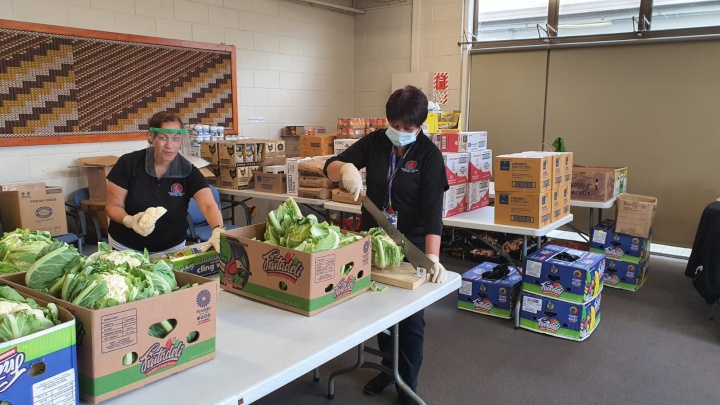Continued vigilance to keep kaumātua safe
Continued vigilance to keep kaumātua safe as alert
levels drop

Hamilton’s Rauawawa
Kaumātua Charitable Trust (Rauawaawa) will continue their
new ‘Covid world’ way of supporting kaumatua until Alert
Level 1 because of how vulnerable elderly are to the virus
and some are anxious about leaving their bubble too
early.
Rauawaawa CEO Rangimahora Reddy says it is vital her team can keep providing services in a way that prevents health risks to the 600 plus kaumātua on their books.
“Most of our kaumātua have underlying health conditions and 80% of them are in their eighties. So, they would get extremely ill or die if they were to get COVID-19, and that reality is front of mind for us here at Rauawaawa.”
“As well as enabling them to stay safe at home and away from high risk places like supermarkets, we have provided signs for their door so that if they have a compromised immune system they can put them up as a protective measure,” she says.
The charity usually provides kaumātua with a range of culturally focussed, and accessible health, social and community-based activities and services to enhance wellbeing. But Rauawawa had to rethink how they still provide social interaction without things like events, exercise classes and community classes.
Rangimahora says initially when their usual programmes stopped, they had a ‘give us five’ campaign, to give them five weeks to keep their kaumātua safe during lockdown.
“We started off by calling our entire register of 640 kaumātua to assess their wellness and need. Kaumātua let us know they wanted to be connected, informed and entertained so we’ve been using Facebook for that and our audience has grown from 1,200 to over 1,600 in lockdown,” she says.
The team have been busy seven days a week and in the last month they have delivered just over 1000 kai packages, 400 plus humble hygiene packages, helped 60 kaumatua to get flu vaccines and created 20 Facebook videos targeted at their growing audience.
Three registered nurses have a pivotal role caring for the highest risk kaumātua - those with three or more long term conditions. Because of their clinical knowledge around infection control, they are best placed visiting kaumātua and wearing appropriate PPE to keep themselves and kaumātua safe. The nursing support service includes weekly phone triaging, home visits when necessary, and arranging GP appointments and medication for kaumātua who don’t have any support.
Regional Manager for Te Puni Kōkiri (Waikato- Waiariki) Rachel Jones says the existing relationships Māori organisations like Rauawaawa have with local kaumatua is making all the difference to the Māori pandemic response.
“I’m pleased that our contribution has gone some way to helping our kaumātua to be so well cared for by Rauawaawa during this unsettling time,” she says.
Rangimahora says the impact of their outreach has been clear from the aroha and appreciation shown by kaumātua and their whānau over messenger, texts, email and in person.
“Their appreciation when you deliver to the door is beautiful, sometimes they are nearly in tears. Some kaumātua have mobility challenges and these visits are really important to them so it is really rewarding when you see that difference we are making,” she says.
One of the challenges Rauawaawa had to overcome was staffing because their usual volunteers couldn’t help because they were in the high-risk kaumātua age group themselves.
“We managed to pull together a rangatahi team from our own whānau to not contaminate our bubbles. There was also no national COVID-19 training so our staff went through World Health Organisation online training so that everyone was on the same page and giving consistent advice to kaumātua,” she says.
Rauawawa says they made the decision with its Board to not open its doors and face to face programmes until Alert Level 1, but life in isolation has had a mixed response from kaumātua.
“Some love it and others are busting at the seams to get out. When there is only one in the whare, it is much harder. Overall though, there remains a certain level of fear amongst kaumātua that coming out at this early stage will put them at risk and we want to help keep them safe,” Rangimahora says.
Background: Te Puni Kōkiri is proud to support hapū,
iwi, marae, Māori providers and organisations as they work
closely with hard-to-reach and vulnerable whānau in their
communities in response to the Covid-19 pandemic. Te Puni
Kōkiri has been able to provide quick and targeted support
through a $10-million Whānau Māori Community and Marae
Response Fund which was part of a Government economic package for Māori.
Funding has given extra help to Māori communities including
those who live in remote areas, kaumātua and the
homeless.


 Gordon Campbell: On The Left’s Electability Crisis, And The Abundance Ecotopia
Gordon Campbell: On The Left’s Electability Crisis, And The Abundance Ecotopia NZCAST: NZCAST Leads Ongoing Cross-Agency Collaboration To Break Down Barriers For Survivors Of State Abuse
NZCAST: NZCAST Leads Ongoing Cross-Agency Collaboration To Break Down Barriers For Survivors Of State Abuse Regional and Unitary Councils Aotearoa: Regional And Unitary Councils Back A Practical FWFP System
Regional and Unitary Councils Aotearoa: Regional And Unitary Councils Back A Practical FWFP System NZ Government: Stay Safe On Our Roads This Easter
NZ Government: Stay Safe On Our Roads This Easter YWCA: Global Push Back Against Gender Equality A Growing Crisis In Aotearoa
YWCA: Global Push Back Against Gender Equality A Growing Crisis In Aotearoa Te Pāti Māori: Ngarewa-Packer - Fast-Tracking Seabed Mining Ignores Māori Opposition And Environmental Precedent
Te Pāti Māori: Ngarewa-Packer - Fast-Tracking Seabed Mining Ignores Māori Opposition And Environmental Precedent New Zealand Defence Force: Defence And Customs Strengthen Maritime Security With Uncrewed Surface Vessels
New Zealand Defence Force: Defence And Customs Strengthen Maritime Security With Uncrewed Surface Vessels


